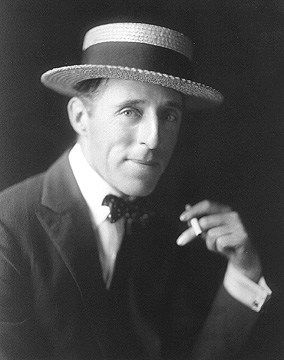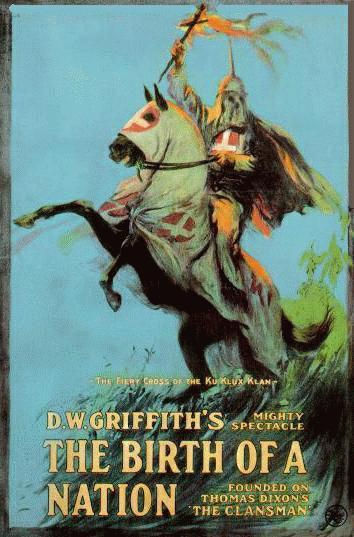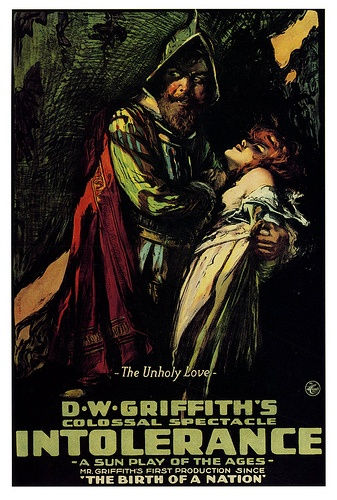D.W. Griffith
- SilentCinemaSchool

- Dec 11, 2020
- 5 min read
Updated: Oct 13, 2021
Many early filmmakers who found success had previous backgrounds in theatre and/or vaudeville. Today's filmmaker is no exception to the rule. But the question we all have is...
What does "D.W." stand for...!?

1875 - 1948
IMDb: D.W. Griffith on IMDb
David Wark Griffith (Aha! That's what it stands for) was born on a country farm in Kentucky. When he was 10 years old. his father passed away, and a few years later his mother relocated the family to the city (namely Louisville). As a teen, D.W. left high school in order to work full time and support his family. He also began a career as a stage actor, and being fond of reading, also tried his hand at scriptwriting.
Eventually, D.W. landed in New York City in 1907, trying to sell a script he wrote. He didn't sell the script - dang it all - but he did decide to become a screen extra and get involved in the budding film industry. The film industry was tiny at the time, so before you know it, the co-founder of Biograph made D.W. a director - and that was the beginning of a legacy, people!

Hard at work! (year unknown)
In 1909, D.W. directed a film adaptation of "The Cricket on the Hearth", by Charles Dickens. This was around the time he worked with the legendary Mary Pickford! Using Dickens' writing as a reference, D.W. used a revolutionary new technique (at the time), now known as "cross cutting" - telling 2 stories alongside of each other. Naturally, someone criticized him for it, and he allegedly said...
"Well, doesn't Dickens write that way??"
The following year, D.W. made a short film in a farming community known as Hollywood, California. This was the first film (of any length) shot in Hollywood! We know what you're thinking. "Wasn't 'The Squaw Man' the first film shot in Hollywood??" Well, yes and no. Jesse L. Lasky's "The Squaw Man" was the first feature length film shot in Hollywood - but not the first film in general.
Fast forward 4 years, and D.W. shot his first feature-length film in 1914, "Judith of Bethulia". Biograph was against making longer films - they thought it would hurt the audience's eyes! Thankfully, D.W. didn't think so and he decided to make more. But Biograph wasn't sold on his vision, so he left Biograph and joined another company (Mutual Film Corporation). Most of his actors went with him. Several re-groupings and company name-changes later, D.W. had formed a studio and was part of the Triangle Film Corporation with 2 other film industry bigwigs, Thomas Ince and Mack Sennett. And then came the controversy...

A movie poster for the abomination that was "The Birth of a Nation" (1915).
In 1915, D.W. directed and produced a film based on a book called "The Clansman: A Historical Romance of the Klu Klux Klan". The film ended up being titled "The Birth of a Nation", but whatever you wanna call it - it was hateful and racist to a fault. On top of making the KKK look like heroes (!), this film downplayed slavery and implies that the freeing of slaves was nothing more than a corrupt political plot. Although this film is often cited as being "responsible" for the popularization of the KKK, it's important to remember that these horrific views were already very common in the U.S. But, as usual - it's easier for the rest of the country to "blame Hollywood" for their own misdeeds!
The NAACP however, was not happy. Who in their right mind would be?? Although they (and other groups) opposed the film and successfully prevented it's showing in several cities, the film was ultimately a hit (!) and did incredibly well at the box office. In fact, it's considered to be one of the first "blockbuster" movies, and it broke all of the box office records set previously. Our hero Oscar Micheaux was likely one of those who were outraged - and rightly so! Riots broke out in several Northern cities at showings - and motions were made to censor the movie, or even ban it completely. D.W. was miffed. He never once apologized or regretted his racist film, unsurprisingly. As a son of Old Kentucky, it would be unheard of!

A poster for the much-better "Intolerance" (1916)

A dazzling scene from "Intolerance". Don't let anyone tell you that Cecil B. DeMille came up with the idea for "extravagant" silent films - D.W. had it long before him!
The following year, D.W. produced "Intolerance", a 2-part epic that featured 4 different stories with one common theme: the harmful effects of intolerance in society. Irony. Although this film is widely praised in the silent film community today, it was not a success - and, because D.W. paid for most of the (very expensive) project with his own money, it kept him broke for the rest of his life.

A poster for "Way Down East" (1920). People still discuss the "iceberg scene"!

Left to right: Charlie Chaplin, Douglas Fairbanks (seated), Mary Pickford
and D.W. Griffith - signing the paperwork to form United Artists!

With 2 of his discoveries, legendary actresses Dorothy and Lillian Gish
D.W. continued making films with different companies and studios throughout the rest of the 1910's and 1920's, and in 1919 he co-founded United Artists with Mary Pickford, Douglas Fairbanks and Charlie Chaplin! Although his films were occasionally successful at the box office, none of them ever received the attention (and ticket sales) that his "The Birth of a Nation" did. It figures! He transitioned to sound and made 2 talkies. Unfortunately, neither one was successful. In 1936, D.W. was awarded an honorary Oscar for his contributions to the film industry.

Directing on set (year unknown)
In 1948, D.W. was discovered unconscious in the lobby of the hotel where he was living (The Knickerbocker). He passed away from a brain hemorrhage on the way to the hospital. A memorial service was held, but few people attended. He is buried in his home state of Kentucky. Although married twice during his life, D.W. had no known children.

Presenting cinematographer Harry Stradling with an Academy Award (1945)

Although his antiquated and downright toxic ideals on race have tarnished his accomplishments, we at SCS feel it's important to acknowledge the positive as well. D.W. Griffith's films in general were well ahead of their time, and countless directors were influenced by him, including the great Charlie Chaplin and Cecil B. DeMille. Charlie once called him "the teacher of us all" - high praise indeed!
D.W. is credited with not only cross cutting, but also the "close up" shot and the "fade out" - all of which are considered essential in today's world of filmmaking. He also donated some of his films to the Museum of Modern Art, preserving them for future generations! The feature film and the art of storytelling were definitely advanced by him, and for that we are thankful. Have a look at one of his (better) films, "Way Down East" below!
References:


.png)



Comments